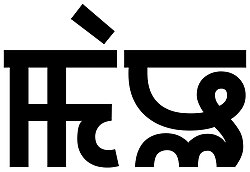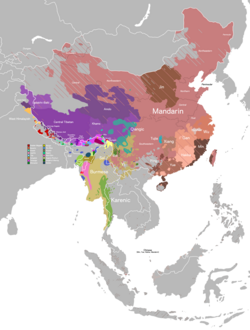Sopvoma language
| Mao | |
|---|---|
| | Sopvoma, Emela, Mao' La | | |
 Mao written in Meitei script | |
| Pronunciation | mau |
| Native to | India |
| Region | Nagaland, Manipur |
| Ethnicity | Mao Naga, Poumai Naga |
Native speakers | 240,205 (2011 census)[1] |
Sino-Tibetian
| |
| Dialects |
|
| Official status | |
Recognised minority language in | India |
| Language codes | |
| ISO 639-3 | Either:nbi – Maopmx – Poumai |
| Glottolog | naga1397 |
Sopvoma or Mao is a Sino-Tibetan language of Angami–Pochuri linguistic sub branch. It is spoken primarily in Senapati district, northwestern Manipur and in Nagaland, India. It is similar to Angami. According to Ethnologue (2009), the Paomata dialect may be the same as Poumei (Poumai) Naga, which has received a separate ISO code.
See Mao Naga Language for further details.
Mao is somewhat similar to the Sino-Tibetian languages in terms of grammar and style of use.
Unlike English it is a phonetic and tonal language. Spoken mainly by the Mao Nagas
A story referring to the Angami peoples and the Mao peoples (Not to be confused with China's ex-chairman) shows how the two amicably split into the north and south (i.e. Nagaland, Manipur), also showing why the two languages are similar.
The script has been lost for years, following a story where a mouse/mice ate the script written on animal-skin causing the script to be lost and ultimately leading to illiteracy in the area, therefore the Latin script has been used (Which hasn't been an accurate way to display the tonal language).
Phonology
Consonants
| Labial | Dental | Alveolar | Palatal | Velar | Glottal | ||
|---|---|---|---|---|---|---|---|
| Plosive | voiceless | p | t̪ | t | k | ||
| aspirated | pʰ | (t̪ʰ) | tʰ | kʰ | |||
| voiced | b | d̪ | (ɡ) | ||||
| Affricate | voiceless | p͡f | t͡s | t͡ʃ | |||
| aspirated | (p͡fʰ) | t͡ʃʰ | |||||
| voiced | b͡v | d͡z | d͡ʒ | ||||
| Fricative | voiceless | f | s | ʃ | h | ||
| voiced | v | z | ʒ | ||||
| Nasal | m | n | ŋ | ||||
| Trill | voiced | r | |||||
| voiceless | ʰr̥ | ||||||
| Lateral | l | ||||||
| Approximant | (w) | j | |||||
- /t͡ʃʰ/ and /w/ only rarely occur, and with /t͡ʃʰ/ only occurring in word-initial position.
- The pre-aspirated voiceless /ʰr̥/, may have a word-initial allophone of [ʂ], [ʂ] rarely occurs phonemically.
- [ɡ] only occurs marginally from loanwords.
- /t̪, p͡f/ in word-initial position may be heard as [t̪ʰ, p͡fʰ] in free variation, rarely as phonemic.
- /h/ may have an allophone of [x] word-initially, word medially in free variation. [x] rarely occurs as a phoneme.
- /m/ before a central vowel /ɨ/ can have an allophone of a labiodental [ɱ].
- /n/ before high vowel sounds can have an allophone of a palatalized [nʲ].
Vowels
| Front | Central | Back | |
|---|---|---|---|
| Close | i | ɨ | u |
| Mid | e | (ə) | o |
| Open | a |
- [ə] only occurs inter-morphemically.
- /ɨ/ can be heard as rounded [ʉ] in free variation.
- In word-initial position, /i, u/ can be lowered to [ɪ, ʊ].
- /e, o/ can be lowered to [ɛ, ɔ] in word-final position.[2]
Our Father (Sample)
| English | Emela | |
|---|---|---|
| Our Father who art in heaven
Hallowed be thy name Thy kingdom come Thy will be done On Earth as it is in Heaven Give us today our daily bread And forgive us our sins As we forgive those who sin Against us Lead us not into temptation But deliver us from evil Amen |
|
Tones
There are 4 tones and a neutral tone:
References
- ^ "Statement 1: Abstract of speakers' strength of languages and mother tongues – 2011". censusindia.gov.in. Office of the Registrar General & Census Commissioner, India. Retrieved 7 July 2018.
- ^ Giridhar, P. P. (1994). Mao Naga Grammar. Mysore: Central Institute of Indian Languages.
- Articles with short description
- Use dmy dates from September 2022
- Use Indian English from July 2019
- All Justapedia articles written in Indian English
- ISO language articles citing sources other than Ethnologue
- Angami–Pochuri languages
- Languages of Manipur
- Languages of Nagaland
- Endangered Sino-Tibetan languages
- All stub articles
- Sino-Tibetan language stubs
- Indian culture stubs
